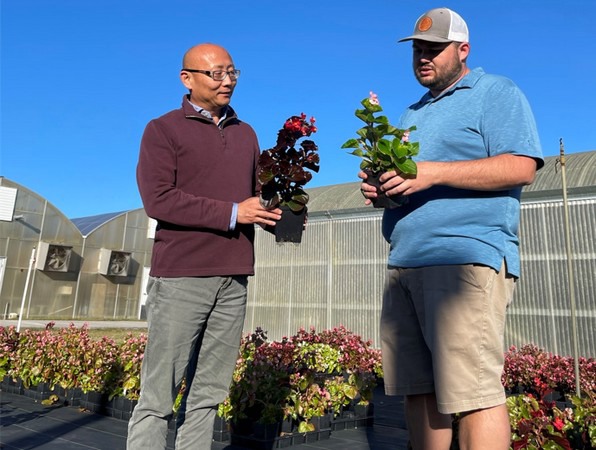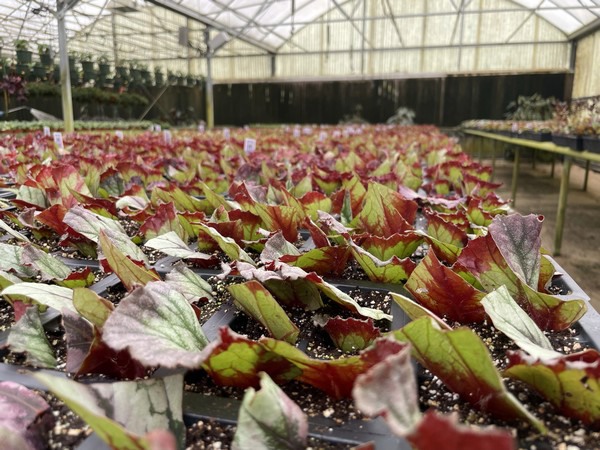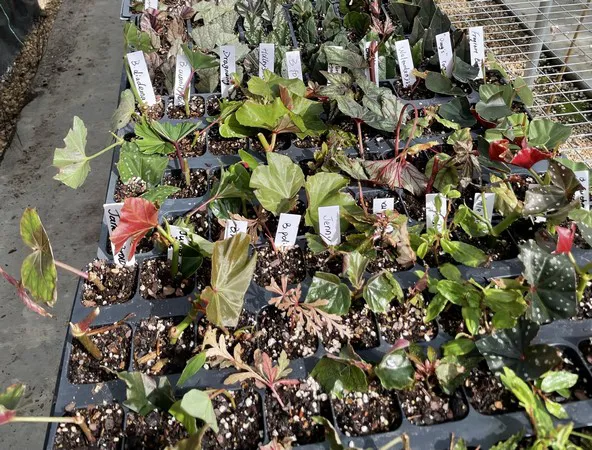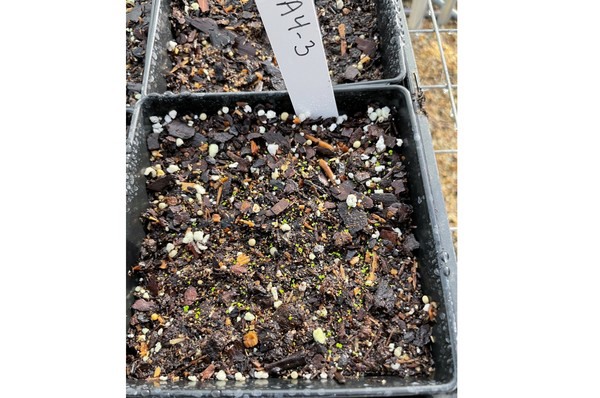“Begonias are one of the most popular plants. Yet their sensitivity to environmental aspects puts stress on the plants and leads to high costs for growers,” says Dr. Alfred Huo, assistant professor of ornamental plant breeding in the Department of Environmental Horticulture at the University of Florida. Recently, they received a joint grant of $175,000 from USDA Agricultural Marketing Service and Florida Department of Agriculture and Consumer Services. Now, the research team is on a mission to enhance stress tolerance in new begonia cultivars.
Dr. Alfred Huo and biological scientist Matthew Creech at the begonia hybrid evaluation site
A new research area
Dr. Huo’s overall research focuses on how plant genetics interact with environmental factors and how this impacts plant growth. So far, the research has encompassed a wide variety of horticultural crops, including lettuce, tomato, snapdragon, and petunia. “Now we are starting to work on begonias because they are among the top five most popular plants found in flower beds. In tropical areas, begonias usually grow under trees, thus not being exposed to strong, direct sunlight. Therefore, when we are producing them as bedding plants, this is an issue we have to solve as we are in need of more weather tolerant varieties. We know that it is not just the heat that affects the plant, but the combination with sunlight, humidity, and high temperatures. These environmental aspects have a significant effect on plant growth.”
Photos by UF/IFAS Matthew Creech
Weather extremities
With weather extremities becoming more frequent, this research is now more important than ever. “In some years, almost all states in the US have had issues with the extreme heatwaves, and these weather extremities are becoming more frequent than they used to. Growers then have to increase their use of watering, shading, and electric cooling to help the stressed plants. In addition, heatwaves come together with drought, which is another stress factor faced by the growers. Begonias are mainly produced in greenhouses, so if we can make begonias more heat tolerant and reduce the water use, growers can save a lot of money in their begonia production.”
Dr. Huo also mentions that this research will not just benefit the growers in tropical areas. He explains that more resilient begonias will also benefit the end-user, as well as European growers, for example. “While heat tolerance may not be an issue for every begonia grower, anyone can highly benefit from drought tolerance and reducing the amount of water necessary for production.”
A challenge: collecting plant materials
So far, begonia research has been mainly focused on evolutionary studies to understand how the begonia evolved, but there has been a lack of research on breeding, leading to scarce information and plant materials. “Before we got this new grant, we received a smaller grant which allowed us to collect planting material. This is important, as it is difficult to make different combinations when you don’t have good genetic diversity. Over the last two years, our begonia collection has grown and now includes more than 240 different types from countries around the world, and we are expecting to expand to 450 by spring 2022.” The researchers are using both traditional breeding and genome editing to improve stress tolerance. The current research project started in January, and they are hoping to release the new stress-tolerant varieties in 3-4 years.
What about the indoor varieties?
There are more than 2,500 species of begonias, some of which are planted outside, whereas some varieties are used as houseplants. So will this research also be beneficial for the indoor varieties that do not have to deal with weather extremities? “While environmental aspects are not affecting indoor plants, it is still beneficial for the grower’s production to have stress-tolerant indoor varieties. Therefore, we are collaborating with local nurseries to see if we can also develop some temperature tolerant indoor Rex begonias, which would be a great advantage for growers.”
For more information:
UF/IFAS
Dr. Alfred Huo
[email protected]
www.alfredlab.com
www.ifas.ufl.edu
